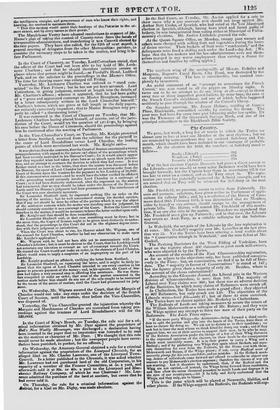In the Court of Chancery, on Tuesday, Lord Cottenham stated,
that the officer of the Court had not been able to lay hold of Mr. Lech- mere Chariton; and that he should therefore subtitute service at places where that person might be fineid,—at Fendall's Hotel, Ledford Park, and on the solicitor to the proceedings in the Master's Office. The time for showing cause was enlarged till Friday.
Yesterday, Mr. Lechmere Charlton was ordered to "stand cons- mitted " to the Fleet Prison ; but he has not yet been arrested. Lord Cottenhain, in giving judgment, entered at length into the details Pf Mr. Charlton's offence ; whence it appeared, that he had been guilty of a" gross and aggravated contempt on Master Brougham, increased by a letter subsequently written to the Lord Chancellor himself." Charlton's letters, which are given at full length in the daily papers, are certainly excessively impudent ; that to Master Brougham may pro- perly be ('ailed" a threatening letter."
It was rumoured in the Court of Chancery on Tuesday, that Mr. Lechmere Charlton having placed himself, ad interim, out of the juris- diction of the Court, would try the question of !aril Vege, by bringing his case before the House of Commons, should the proceedings against him be continued after the meeting of Parliament.
In the Vice-Chancellor's Court, on Tuesday, Mr. Knight presented a letter from Scotland, received from the solicitor for the plaintiff in the cause of Lord Breadalbane versus Lord Chandos, the leading points of which were mentioned last week. Mr. Knight said— It was obvious from the conteots, that the Court of Session entertained a strong misapprehension with regard to the nature awl object of the proceedings which had been recently instituted in his Honour's Court ; fur it would almost appear that they regarded what had taken place here as an attack upon their jurisdic- tion, and an attempt to overturn the decision to which they had come. It was Anther stated as a fact in the letter, that since the matter was discussed before his Honour, the agent of Lord Chandos had procured an interim order from the Court of Session upon the trustees for the payment to his Lordship of 70,000/. If this statement were correct—and he would have the letter verified by affidavit —the proceeding would certainly involve Lord Chandos in a contempt of Court ; as it had been distinctly understood, after the argument on the motion had terminated, that no step should be taken under the decree of the House of Lords until his Honour's judgment had been pronounced. The interference of the Court was now absolutely necessary.
Sir Launcelot Shadwell said, he expressed nothing like an order on the hearing of the motion ; but he well remembered stating his decided opinion, that if any act should be done by either of the parties which it was the object of the motion to restrain while the matter was standing over for judgment, he should certainly consider it as a contempt of the Court. Before the Court could interfere in the matter, it would be necessary to have the letter verified upon oath.
Mr. Knight said that should be done immediately. Sir Launcelot Shadwell said, in that case something must be done; but in the mean time, the Conn of Session ought to be given most distinctly to under- stand, that the proceedings in this Court did not in the slightest degree inter- fere with their judgment or jurisdiction.
When the Court was about to rise, his Honour asked Mr. Wigram, one of the counsel for Lord Chandos, whether he had any observation to make epos Mr. Knight's application ? Mr. Wigram said, he had not been able yet to communicate with Lord Chandos's solicitor; but it must be obvious to the Court, that his Lordship could not entertain any intention to commit an act of contempt towards the Court. Me trusted the Court would not make an order, in the absence of Lord Chandos„ which would seem to imply a suspicion of an impropriety on the part of his Lordship.
Mr. Knight produced an affidavit, verifying the letter from Scotland.
Sir Launcelot Shadwell, on reperusing the letter, said it might be fairly in- ferred that the agent of Lord Chandos intended to use every exertion in his power to procure payment of the money ; and, in,his opinion, the Court of Sea- aim hail taken a very unusual step in affording him assistance. He was there- fore compelled to make an order, that none of the parties concerned in the motion made before him should do any one of the acts sought to be restrained by the terms of the notice of motion, until the Court had pronounced its judg. anent.
On Wednesday, Mr. Wigram assured the Court, that the Marquis of Cbandos would not take any steps under the decision of the Scotch Court of Session, until the motion, then before the Vice-Chancellor, was disposed of.
Yesterday, the Vice-Chancellor granted the injunction whereby the Marquis and Marchioness of Chandos are restrained from taking pro- ceedings against the trustees of Lord Breadalbane's will for the 100,0001.


























 Previous page
Previous page